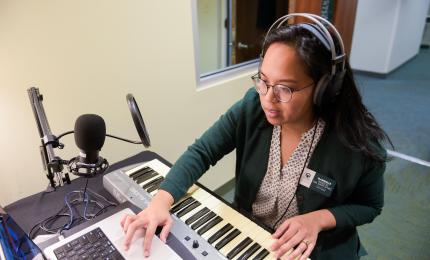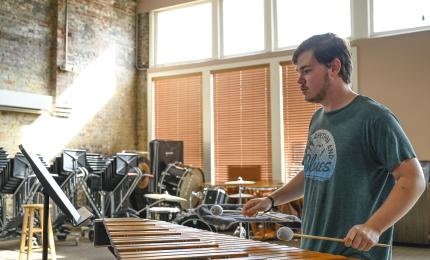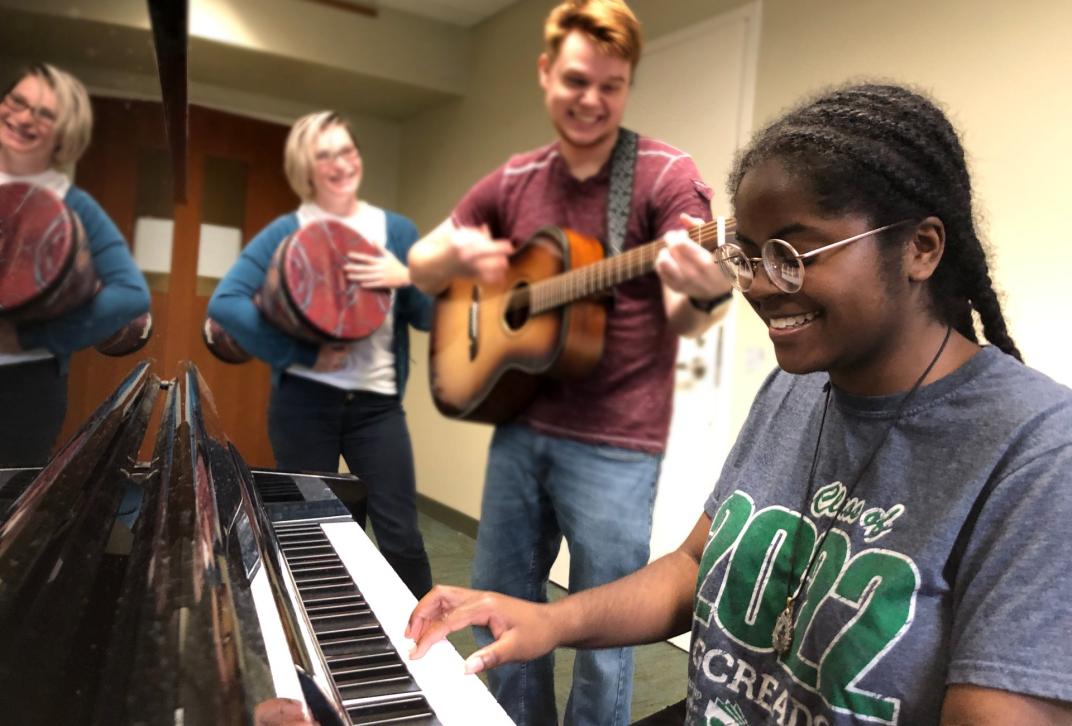Preparing students for the creative and evolving field of music therapy
The Bachelor of Music Therapy degree program prepares students for a rewarding career in music therapy and requires extensive training in both musical and clinical skills. The BMT program provides the interdisciplinary and clinical training necessary to meet the diverse emotional, social, cognitive, and physical needs of individuals throughout the lifespan. As an established allied health profession, music therapists work in a variety of settings including private practices, hospitals, hospices, schools, and other facilities. Graduates of this program are eligible to sit for the Certification Board of Music Therapists (CBMT) exam. Upon passing the exam, graduates earn the MT-BC (music therapist - board certified) credential and are then eligible to apply to practice as a licensed professional music therapist (LPMT).
Key Benefits of this Degree
Students gain clinical experiences through access to approximately 20 different local and regional facilities, hospitals, and schools.
Students have the unique opportunity to observe and work with professional music therapists through the on-campus Music Therapy Clinic of Georgia College.
Students have access to a wide variety of resources to support their clinical training and coursework including a multitude of adaptive instruments and equipment, a sensory room, a dedicated clinic room, a telehealth work station, and several Somatron vibro-acoustic products.
Students have opportunities for undergraduate research and professional presentations at regional, national and international conferences in music therapy.
What can my career look like with this degree?

Career Paths for Music Therapy Majors
The breadth and depth of knowledge gained will prepare graduates for a variety of career paths...
What:
Music Therapist
Adaptive Music Teacher
Expressive Arts Therapist
Creative Arts Therapist
Activity Coordinator/Director
Program Coordinator
Rehabilitation Therapist
Recreation Therapist
Private Practice Owner
Independent Contractor
Where:
Daycare Centers
K-12 Public & Private Schools
Recreation Centers
General Hospitals
Special Education Facilities
Pediatric Hospitals
Day & Residential Programs for Individuals with Disabilities
Senior Living Communities
Community Centers,
Veteran's Affairs
Hospice & Palliative Care Agencies,
Correctional Facilities, Forensics Facilities
Behavioral Health Hospitals
Child & Adolescent Treatment Centers
Financial Outcomes for Music Therapy Majors
According to the American Music Therapy Association, music therapy professionals in Georgia can expect to earn $56,500 a year. The national average salary for a music therapy major is $58,973.
Learn more about financial outcomes for Music Therapy majors
Additional Career Information
Learn more about careers available to music therapy majors.
OUR STUDENT ORGANIZATIONS
We have several different student organizations to help you get plugged in with us.
Sigma Alpha Iota
Sigma Alpha Iota is a professional music fraternity for women. Its purpose is to foster interest in music and to promote social contact among persons sharing an interest in music. The Beta Rho Chapter at Georgia College, founded on April 17, 1953, is the second oldest chapter in Georgia.
Phi Mu Alpha
Phi Mu Alpha Sinfonia, founded in 1898, is a national fraternity for men. It is open to all men who have an interest in music, regardless of major. The Eta Alpha Chapter was the first fraternity formally established on campus at Georgia College.
Music Therapy Society of Georgia College
Music Therapy is an established health profession in which music is used within a therapeutic relationship to address physical, emotional, cognitive, and social needs of individuals. The purpose of the Music Therapy Society of Georgia College is to educate and increase awareness of the student body and community about the benefits and opportunities of music therapy, encourage professional growth of students pursuing a major/minor in music therapy, provide volunteer music therapy services and other community services to the surrounding public, and to raise funds for SER-AMTA Conference, which is held every year. Membership is open to any student, no matter what his, her, or their major or minor is, who has an interest in and would be an advocate for music therapy.

ACCREDITATION
This program is designed to satisfy the current educational requirements of, and is accredited by the National Association of Schools of Music. The program is fully approved by the American Music Therapy Association.

